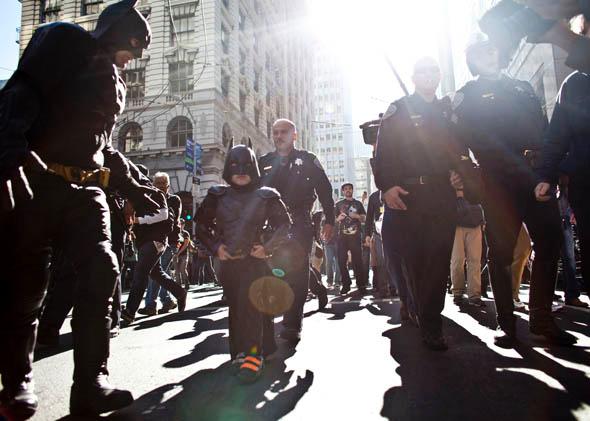When a 5-year-old boy named Miles Scott, now better known across the country as Batkid, asked to become his favorite superhero for a day, he and his parents couldn’t have expected his wish to lead to an adventure in which thousands of people turned San Francisco into Gotham.
Miles’ story quickly gained national attention, earned Miles a personal video message from the president, and garnered praise for Make-a-Wish America (formerly the Make-a-Wish Foundation), the organization that brought Miles’ wish to life. In return for granting Batkid’s wish, Make-a-Wish received some great press and saw a spike in donations. How does the organization, which grants roughly 14,000 wishes a year, determine who gets to see their wishes come true?
According to Make-a-Wish, any child between the ages of 2½ and 18 who has a “life-threatening medical condition” is eligible for the program. Why is the lower cutoff age 2½? According to Make-a-Wish, this is when children’s verbal skills are improving and they can begin to express their wishes. Children can be referred for Make-a-Wish by a parent, legal guardian, social worker, or a medical professional, or they can refer themselves. The wishes are granted through Make-a-Wish’s 61 local chapters across the country. After a child is referred and deemed eligible, Make-a-Wish sends paperwork to the child’s treating physician to verify the medical condition. The illness must be “progressive, degenerative, or malignant”—an illness that puts the child’s life in jeopardy. Make-a-Wish largely leaves this determination up to the doctors as the main check to prevent families with healthy children from scamming the system.
A big misconception about Make-a-Wish is that the organization grants wishes only to children with terminal illnesses. Last year, one father denied his 4-year-old daughter her wish trip to Disney World because she had recovered from leukemia and he believed the wishes should only be given to children who are terminally ill. This used to be the Make-a-Wish policy, but they’ve since changed their policy to include children with serious illnesses, some of whom, thankfully, do recover. Batkid, for instance, is in remission from leukemia. Make-a-Wish now sees its role as a step in the healing process rather than as a final wish.
Aside from determining a child’s eligibility, a sensitive task for Make-a-Wish staff is figuring out whether the wish is truly what the child wants, or whether it’s the child’s parents who want a free eight-day cruise in the Bahamas. For that reason, Make-a-Wish sends volunteers to interview candidates and ask children why they want their wish. If it seems like the child is being coerced into the wish, it puts the organization in a tricky spot. “It’s hard to say no,” says Jessica Glasser, a spokeswoman for Make-a-Wish’s Mid-Atlantic chapter.
There are some types of wishes the group doesn’t grant: They won’t provide children with firearms—which Ted Nugent and hunters’ groups have taken umbrage at—and they won’t “change the structure of the home.” They won’t grant wishes for activities that put the child in danger, such as skydiving. And the child must not have been granted a wish from Make-a-Wish or another organization before.
There are also some budgetary restrictions. Though Make-a-Wish never denies a wish based on expense, more costly wishes may not be granted until outside donations come in or there is room in the next budget cycle. A girl named Mercedes wants to visit her family in Ghana, but her wish can’t come true until Make-a-Wish collects enough frequent-flyer-mile donations. You can donate to Make-a-Wish, and help future Batkids, here.
Got a question about today’s news? Ask the Explainer.
Video Explainer: Neanderthal Vs. Homo Sapiens: Who Would Win in a Fight?
